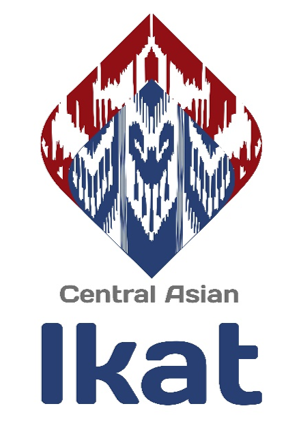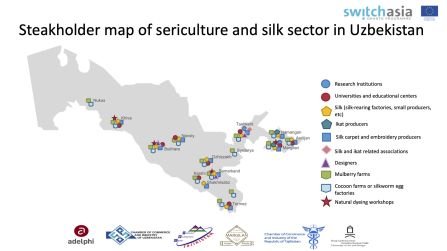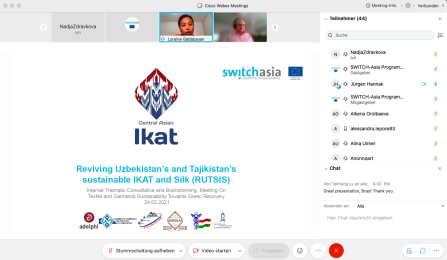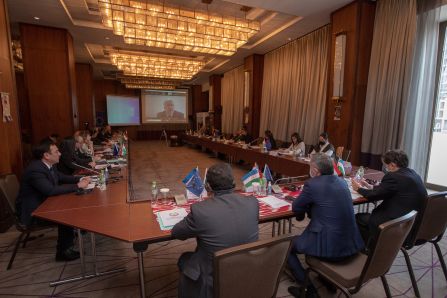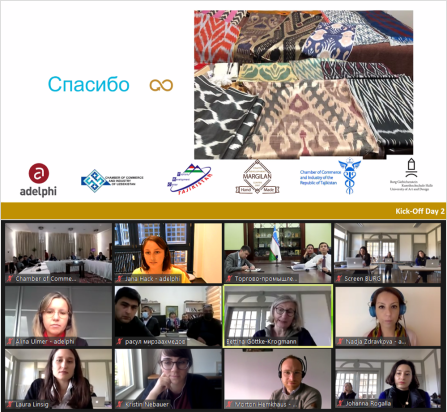Project updates
|
November 2022 |
On 7 November 2022, BURG hosted an online training on the sustainable use of synthetic dyes for textile dyeing. Henning Frančik from BURG SustainLab opened the training with an overview of common synthetic dyes and their chemical composition, and explained the potential impacts and risks to water systems and organisms when released into the environment. Further contributions focused on the resource-saving and environmentally friendly use of synthetic dyes with silk and wool and introduced tools for improving the quality of dyeing results. The theoretical presentations were complemented by practical exercises on the calculation of dye recipes |
|
September 2022 |
On 28-29 September 2022, the second indigo dyeing training was conducted in the framework of the RUTSIS project. While the last training in August 2021 focused on making an indigo paste from local indigo plants, last week's training involved making dye vats from two types of indigo pastes - the Uzbek paste obtained from the training last year and, for comparison, a paste from plants grown in the North of Thailand. We were pleased to again have indigo experts Patricia and Lamorna Cheesman with us who step-by-step guided through the vat making process and also demonstrated their practice of dyeing silk and cotton yarn using an indigo vat. Besides giving a video tour of how to set up an own indigo studio, the experts provided information on the benefits of dyeing with natural indigo and vat maintenance in cooler climates, like in Central Asia. Apart from the option of attending one of the two local venues, in Istaravshan, Tajikistan and in Margilan, Uzbekistan, participants could also follow the training via ZOOM. |
| September 2022 |
A Zero Waste Draping (or Design) Training took place in September (13.-16.09.2022 (Tajikistan) / 20.-23.09.2022 (Uzbekistan)). The aim of the 4-day-training was to create a zero waste pattern design of a jacket with the usual 60 cm width of an ikat fabric. 10 participants per each country were guided through the process steps of draping, pattern development and sewing by draping and pattern expert Jasmina Benferhat. Using this technique, each participant created an individualized pattern prototype made from plain cotton or local ikat fabric. The training ended on the last day with the award of certificates for participants and presentation of the results, to which we were pleased to welcome external guests. From each training, 4 designers were selected by a lottery to take part in a transcultural and interdisciplinary collaboration between designers from Uzbekistan, Tajikistan and Germany over the next few months. |
| February 2022 |
A roundtable was held in the Tajik northern city of Khujand in February to discuss development of cocoon breeding and production of silk and adras in Tajikistan, says the Consultative Council on Improvement of Investment Climate under the President of Tajikistan. |
| November 2021 | The project organized a catwalk featuring garments designed by Nafisa Imranova to showcase local potential and talents. The fashion show took place on 21 November 2022 in Dushanbe before the Central Asia EU Ministerial meeting. |
| June 2021 |
Woven ikat textiles made of silk are a cultural heritage in Central Asia, but market forces have put the craft at risk. A three-day fair dedicated to reviving ikat fabrics in Tajikistan and Uzbekistan took place in Dushanbe in early June. adelphi co-organised the event. The Atlas Adras Festival took place in Tajikistan from 6-8 June 2021. Organised by the Ministry of Industry and New Technologies of the Republic of Tajikistan along with adelphi, UNIDO and other partners, the event was part of the adelphi project “Reviving Uzbekistan's and Tajikistan's Sustainable Ikat and Silk (RUTSIS)”, which receives support from the SWITCH-Asia programme. The first day of the fair began with a display of silk clothes by leading designers from Tajikistan and Uzbekistan. In the afternoon, a B2B meeting of silk and ikat producers from both countries took place, enabling stakeholders from the sector to connect and expand their business networks. The RUTSIS project organised a discussion for the second day of the fair, where representatives from Tajikistan and Uzbekistan talked about geographical indications (GI) for ikat and sericulture products from the region. Participants set up a working group to further develop the GI concept; the group will meet four times between now and 2023. On the afternoon of the second day, an additional round of B2B meetings took place with producers from both countries. The final day of the fair, a roundtable was held on policies in the sericulture sector as well as the potential of ecolabelling for silk products made in Tajikistan and Uzbekistan. Taking place at the Chamber of Commerce and Industry of the Republic of Tajikistan, one of the main goals of the session was to encourage policymakers to take part in an interest group that meets regularly to discuss strengthening the silk sector and facilitating access to global markets. In addition to adelphi, the Burg Giebichenstein University of Art and Design Halle, which is also a part of the project consortium, joined the event online. Local project partners were present in Dushanbe, including the Tourism Development Center and the Chamber of Commerce and Industry from the Tajik side, as well as the Uzbek Margilan Crafts Development Center and Uzbekistan's Chamber of Commerce and Industry. An EU-funded project, RUTSIS aims to support global market access and promote sustainable manufacturing concepts for silk products made in Uzbekistan and Tajikistan. |
| February 2021 |
Experts from the Chamber of Commerce have created a map of participants in the silk and ikat value chain of Uzbekistan In February 2021, in the frames of the RUTSIS project funded by the European Union, experts from the Chamber of Commerce have created a map of the silk and ikat value chain stakeholders in Uzbekistan, which includes enterprises, designers, universities, “ustod- shogird” learning workshops and research centers in this area. The stakeholder map provides a general overview of existing opportunities for interregional integration for beneficiaries and stakeholders in order to effectively build new supply chains. It also enables their involvement in project activities on the organization of sustainable production and production improvement. The project participation provides an opportunity for companies to learn about modern technologies for the implementation of sustainable production methods and thereby increase the international recognition of their products. Interested companies engaged in sericulture and ikats production can apply to participate in the project by contacting the Chamber of Commerce and Industry of Uzbekistan.
|
| February 2021 |
SWITCH Asia Internal Thematic Consultative and Brainstorming Meeting On Textile and Garments Sustainability Towards Green Recovery On the 24th of February 2021 SWITCH Asia invited RUTSIS to present the project including current ongoing activities at the Internal Thematic Consultative and Brainstorming Meeting On
|
| November 2020 |
Second Online-Kick-off with contract signing ceremony “Developing new sustainable products – but always considering the tradition” – with these words the representative of the EU Delegation of Tajikistan Francesco Straniero concluded his speech at the official kick-off conference for a EU funded project under the name RUTSIS. The event was held on the 26th of November 2020 in the Hilton Hotel in Dushanbe, Tajikistan. Moderated by Dilshod Mirsaidov, the conference was officially opened with welcoming speeches by representatives from the Ministry of Industry, Technology and Innovations of the Republic of Tajikistan, the Ministry of Agriculture of the Republic of Tajikistan as well as the Chambers of Commerce and Industry of both countries. Representatives from the EU Delegation of both Uzbekistan and Tajikistan held their speeches, both highlighting the relevance of the project for the cooperation between the EU and the two Central Asian countries. In the second part of the event, more specific project insights were shared with conference participants. While adelphi presented the project achievements of the last months as well as the upcoming activities, the two Chambers of Commerce and Industry shared insights on their research on Laws and certification as well as a survey, which was conducted among silk value chain stakeholders. BURG University finally explained their vision of a textile database, which they aim to establish throughout and beyond the project. After some closing remarks by Dr. Azkar Bazarovich of the Technological University in Dushanbe, who again underlined the importance of the modernization along silk value chains in Tajikistan and Uzbekistan for increasing the production volume of silk, the conference came to its end with a press conference.
|
| October 2020 |
Online Kick-off: EU-SWITCH Project RUTSIS in Central Asia has officially begun Traditional manufacturing of silkproducts with natural dyes is close to vanishing in Uzbekistan and Tajikistan. An EU-SWITCH Project, which aims to revive the silkindustry in both countries, while establishing sustainable textile production principles has now officially launched with an Online-Event. The two Central Asian countries are connected by a long common history of handicraft for silk production and natural dyeing. The project was initiated to revive this tradition, economically stabilize the sector and overcome sustainability risks and has now officially begun. The goal of the Kick-off Event was to enable all six partners to introduce each other, create a common understanding of roles and responsibilities as well as to clarify questions. Being responsible for the project lead, adelphi moderated the two-day event. With an overall implementation timeframe of three years, the coordination of planned activities under the consideration of Covid-19 restrictions took a central role in the event.
|
| March 2020 |
Project start |
